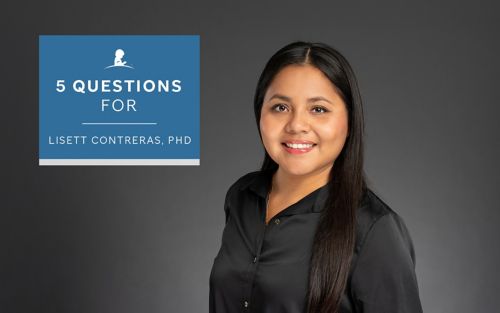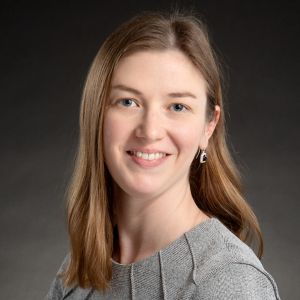St. Jude Family of Websites
Explore our cutting edge research, world-class patient care, career opportunities and more.
St. Jude Children's Research Hospital Home

- Fundraising
St. Jude Family of Websites
Explore our cutting edge research, world-class patient care, career opportunities and more.
St. Jude Children's Research Hospital Home

- Fundraising
5 Questions for Lisett Contreras, PhD

This question-and-answer series explores the motivations, inspirations and accomplishments of investigators at St. Jude. Lisett Contreras, PhD, is a postdoctoral researcher in the laboratory of Jeffery Klco, MD, PhD, in the St. Jude Department of Pathology. Her research focuses on molecular and biological causes of pediatric myeloid tumors.
1. What do you enjoy most about being a scientist?
The constant opportunity to explore my curiosity and contribute to advancing knowledge. Science is always evolving, and I love being part of this dynamic process. At St. Jude, I have the privilege of seeing how my research can directly make a meaningful impact on the field and in patients’ lives. To me, being a scientist is about asking important questions and using various tools and techniques to uncover possible answers. The process of taking a hypothesis, exploring it through experimentation and turning it into a concrete answer is incredibly rewarding. What excites me most is that even the smallest discovery can lead to something significant, and that sense of progress drives my passion for science.
2. What questions are you trying to answer through your research?
At St. Jude, our mission is to understand and treat catastrophic pediatric diseases. Currently, I’m investigating a newly identified subtype of pediatric acute myeloid leukemia (AML). Leukemia is the most common cancer in children, and AML is the second most common form of leukemia. However, the genomic classification of pediatric AML is broad and not fully understood. In our research group within the Department of Pathology, we are working to close this knowledge gap and improve our understanding of the genetic factors that drive pediatric AML.
One key outcome of our research is identifying a novel classification system for pediatric AML, which includes a subtype characterized by tandem duplications in the UBTF transcription factor (referred to as UBTF-TD AMLs). My focus is on understanding the molecular mechanisms behind UBTF-TD AMLs. Investigating this subtype is critical because patients with this genetic alteration typically have a poor prognosis and are at a higher risk of relapse. I believe that by studying the biology of UBTF-TD AMLs, my research could lead to changes in treatment strategies, as this is a newly recognized subtype of AML. It’s essential to deepen our understanding of these less-defined subtypes, especially given their significant impact on patient outcomes.
3. What resources or capabilities set St. Jude apart as a great place to do research?
At St. Jude, I’m fortunate to be part of such a collaborative environment where I can directly see the impact of my research. St. Jude founder Danny Thomas’s vision for an integrated space has truly come to life here. The resources at St. Jude are unparalleled, with a wide range of shared resources and core facilities that equip us to advance our research. Since arriving at St. Jude a year and a half ago, I’ve been supported by numerous resources — whether it’s learning new techniques like flow cytometry or navigating the grant-writing process. Having a centralized hub of resources like this is crucial for facilitating research and accelerating results. It greatly enhances our productivity and enables the discovery of new insights.
4. How have mentors at the different stages of your training shaped your career?
I’ve been fortunate to have incredible mentors throughout my career, each playing a crucial role in shaping me into the scientist I am today. From the start, they encouraged my independence while offering unwavering support. One of the most impactful ways my mentors shaped me was by instilling the trust to take risks, learn from failure and persevere through challenges. This philosophy has been key to my growth, driving me to continuously explore, question and learn.
My scientific journey began in El Paso, Texas, where my undergraduate mentor sparked my interest in research. Although I had a strong interest in science, I lacked technical expertise. My mentor patiently taught me, allowing me to practice independently and learn from my mistakes. This hands-on approach helped develop my critical thinking and independence, which were essential as I explored cancer-related cellular pathways. My doctoral mentor encouraged me to embrace challenges and experimentation, helping me overcome the self-doubt I felt as a first-generation college graduate. His belief in my abilities gave me the foundation to master research techniques and deepen my understanding of complex topics, including leukemia progression and cancer therapies. Now, as a postdoctoral researcher at St. Jude, I’m guided by a mentor who challenges me to confront the unknown while providing patience and support as I grow into an independent scientist.
At every stage of my career, my mentors have equipped me with the tools, confidence and mindset to keep pushing forward in science. They’ve shaped me into a scientist driven by curiosity, hard work and an unyielding desire to expand the boundaries of knowledge.
5. What is one piece of advice you’d give to people considering careers in science?
Do not be afraid to explore the unknown because that is the essence of science: uncovering new ideas. Science is a wonderfully diverse field, both in terms of the people it brings together and the opportunities it offers. I’ve been fortunate to work with and form lasting friendships with individuals from various countries. Science has also allowed me to travel across the United States to share my research. For anyone considering a career in science, I wholeheartedly encourage you to pursue it.







